Connect With Us
Blog
Items filtered by date: December 2024
Onychomycosis and the Effectiveness of Laser Treatment
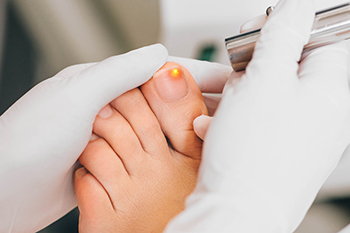
Onychomycosis is a fungal infection that causes the nails to become discolored, thickened, and brittle. This condition is commonly found in toenails but can also affect fingernails. The infection occurs when fungi, typically dermatophytes, invade the nail bed leading to visible damage. Traditional treatments for onychomycosis include antifungal creams and oral medications, but they may take time or have side effects. Laser treatment has become an effective alternative, as it uses targeted light to penetrate the nail and destroy the fungus without harming surrounding tissue. The heat from the laser kills the fungal cells, promoting healing and reducing the risk of recurrence. Laser treatment for onychomycosis is generally safe, with minimal side effects, and can offer quicker results than n other treatments, making it a popular choice for those seeking relief from this persistent condition. If you have developed toenail fungus, it is suggested that you contact a podiatrist who can discuss whether laser treatment is right for you.
Laser treatment can be an effective way to get rid of toenail fungus. If you have any questions about laser treatment, consult with one of our podiatrists from New England Foot and Ankle. Our doctors will assess your condition and provide you with quality treatment for fungal nails.
What Are Toenail Fungal Infections?
Onychomycosis, or fungal infection of the nail, is a relatively common and non-serious condition. Around 10 percent of U.S. citizens are afflicted with fungal nails. Common forms of fungus that infect the nail include dermatophytes, yeasts, and molds.
Symptoms of Toenail Fungal Infections Include:
- Nail thickening
- Brittleness of the nail
- Discoloration of the nail
Diagnosis for Fungal Nails
Fungal infections are diagnosed by fungal culture and microscopy. This will rule out any other conditions such as nail trauma, psoriasis, lichen planus, and onychogryphosis.
What Is Laser Treatment?
Laser treatment is a non-invasive, safe, quick, and painless procedure that uses the heat from a laser to kill fungus in the nail. Each infected nail is targeted with a laser for several minutes. The treatment is usually utilized several different times over a select period. During this time, a podiatrist will keep an eye on the infection.
If you have any questions, please feel free to contact one of our offices located in Chelmsford and Newburyport, MA . We offer the newest diagnostic and treatment technologies for all your foot care needs.
Possible Reasons for Burning and Burning in the Achilles Tendon
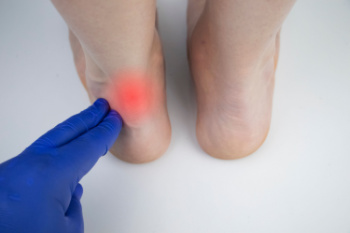
Pain and burning in the Achilles tendon are often signs of Achilles tendinitis, an inflammation of the tendon that connects the calf muscles to the heel bone. This condition commonly results from overuse, particularly in athletes who engage in repetitive activities like running, jumping, or sudden direction changes. Wearing poor footwear, improper stretching, or tight calf muscles can also contribute to the development of Achilles tendinitis. As the tendon becomes irritated, individuals may experience pain that worsens with activity or after long periods of rest. In some cases, the tendon may feel warm, swollen, or tender to the touch. Over time, without proper treatment, Achilles tendinitis can become chronic, leading to further damage and weakness in the tendon. If you have sustained an Achilles tendon injury, it is suggested that you promptly schedule an appointment with a podiatrist who can effectively treat this condition.
Achilles tendon injuries need immediate attention to avoid future complications. If you have any concerns, contact one of our podiatrists of New England Foot and Ankle. Our doctors can provide the care you need to keep you pain-free and on your feet.
What Is the Achilles Tendon?
The Achilles tendon is a tendon that connects the lower leg muscles and calf to the heel of the foot. It is the strongest tendon in the human body and is essential for making movement possible. Because this tendon is such an integral part of the body, any injuries to it can create immense difficulties and should immediately be presented to a doctor.
What Are the Symptoms of an Achilles Tendon Injury?
There are various types of injuries that can affect the Achilles tendon. The two most common injuries are Achilles tendinitis and ruptures of the tendon.
Achilles Tendinitis Symptoms
- Inflammation
- Dull to severe pain
- Increased blood flow to the tendon
- Thickening of the tendon
Rupture Symptoms
- Extreme pain and swelling in the foot
- Total immobility
Treatment and Prevention
Achilles tendon injuries are diagnosed by a thorough physical evaluation, which can include an MRI. Treatment involves rest, physical therapy, and in some cases, surgery. However, various preventative measures can be taken to avoid these injuries, such as:
- Thorough stretching of the tendon before and after exercise
- Strengthening exercises like calf raises, squats, leg curls, leg extensions, leg raises, lunges, and leg presses
If you have any questions please feel free to contact one of our offices located in Chelmsford and Newburyport, MA . We offer the newest diagnostic tools and technology to treat your foot and ankle needs.
Wounds That Don't Heal Need to Be Checked
Definition and Causes of Plantar Warts
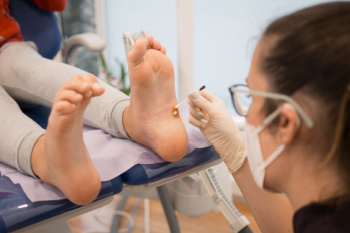
Plantar warts are small, rough growths that appear on the soles of the feet. They are caused by an infection with the human papillomavirus, commonly known as HPV. This virus enters the skin through tiny cuts or breaks, causing the skin to grow abnormally. Plantar warts are typically firm, flat, and may have a rough surface with black dots in the center, which are blood vessels. The condition is highly contagious and can spread through direct contact with an infected surface, such as public showers or swimming pools. People with weakened immune systems, children, and those with frequent barefoot contact in communal areas are more likely to develop plantar warts. The warts can become uncomfortable, especially when pressure is applied from walking or standing for long periods. If you have developed a plantar wart, it is suggested that you consult a podiatrist who can effectively treat this condition.
Plantar warts can be very uncomfortable. If you need your feet checked, contact one of our podiatrists from New England Foot and Ankle. Our doctors will assist you with all of your foot and ankle needs.
About Plantar Warts
Plantar warts are the result of HPV, or human papillomavirus, getting into open wounds on the feet. They are mostly found on the heels or balls of the feet.
While plantar warts are generally harmless, those experiencing excessive pain or those suffering from diabetes or a compromised immune system require immediate medical care. Plantar warts are easily diagnosed, usually through scraping off a bit of rough skin or by getting a biopsy.
Symptoms
- Lesions on the bottom of your feet, usually rough and grainy
- Hard or thick callused spots
- Wart seeds, which are small clotted blood vessels that look like little black spots
- Pain, discomfort, or tenderness of your feet when walking or standing
Treatment
- Freezing
- Electric tool removal
- Laser Treatment
- Topical Creams (prescription only)
- Over-the-counter medications
To help prevent developing plantar warts, avoid walking barefoot over abrasive surfaces that can cause cuts or wounds for HPV to get into. Avoiding direct contact with other warts, as well as not picking or rubbing existing warts, can help prevent the further spread of plantar warts. However, if you think you have developed plantar warts, speak to your podiatrist. He or she can diagnose the warts on your feet and recommend the appropriate treatment options.
If you have any questions please feel free to contact one of our offices located in Chelmsford and Newburyport, MA . We offer the newest diagnostic and treatment technologies for all your foot and ankle needs.
Key Facts About Gout in Children
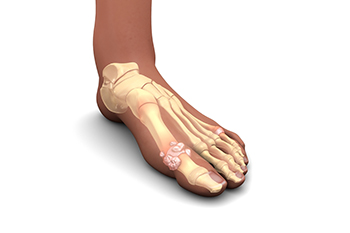
Gout in children is rare but can still occur, usually due to genetic factors or underlying medical conditions, such as metabolic disorders. While it is more commonly seen in adults, particularly older men, certain children may develop gout due to high uric acid levels in their blood. These elevated levels can lead to the formation of urate crystals in the joints, causing painful inflammation. Common symptoms of gout in children include severe joint pain, swelling, and redness, often affecting the big toe or other joints. In some cases, conditions such as obesity, kidney disease, or a family history of gout may increase the risk. Early diagnosis and treatment are essential to managing gout in children, often involving medications to reduce uric acid levels and prevent flare-ups. If your child has symptoms of gout, it is strongly suggested that you promptly contact a podiatrist who can guide you on effective management techniques.
Gout is a painful condition that can be treated. If you are seeking treatment, contact one of our podiatrists from New England Foot and Ankle. Our doctors will treat your foot and ankle needs.
What Is Gout?
Gout is a form of arthritis that is characterized by sudden, severe attacks of pain, redness, and tenderness in the joints. The condition usually affects the joint at the base of the big toe. A gout attack can occur at any random time, such as the middle of the night while you are asleep.
Symptoms
- Intense Joint Pain - Usually around the large joint of your big toe, and it most severe within the first four to twelve hours
- Lingering Discomfort - Joint discomfort may last from a few days to a few weeks
- Inflammation and Redness -Affected joints may become swollen, tender, warm and red
- Limited Range of Motion - May experience a decrease in joint mobility
Risk Factors
- Genetics - If family members have gout, you’re more likely to have it
- Medications - Diuretic medications can raise uric acid levels
- Gender/Age - Gout is more common in men until the age of 60. It is believed that estrogen protects women until that point
- Diet - Eating red meat and shellfish increases your risk
- Alcohol - Having more than two alcoholic drinks per day increases your risk
- Obesity - Obese people are at a higher risk for gout
Prior to visiting your podiatrist to receive treatment for gout, there are a few things you should do beforehand. If you have gout you should write down your symptoms--including when they started and how often you experience them, important medical information you may have, and any questions you may have. Writing down these three things will help your podiatrist in assessing your specific situation so that he or she may provide the best route of treatment for you.
If you have any questions, please feel free to contact one of our offices located in Chelmsford and Newburyport, MA . We offer the newest diagnostic and treatment technologies for all your foot care needs.
Facts About Diabetic Foot Problems
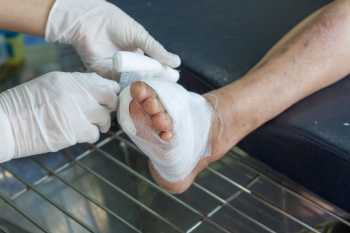
Diabetes can significantly affect foot health by damaging nerves and blood vessels, which increases the risk of infections and ulcers. Nerve damage, known as peripheral neuropathy, can cause numbness, tingling, or pain, reducing the ability to sense injuries or temperature changes. Blood vessel damage can impair healing, leaving minor injuries like cuts or blisters susceptible to infection. Daily foot checks for diabetics are essential to identify blisters, cuts, or signs of redness that may indicate the onset of complications. Proper foot care includes washing feet daily with warm water, drying them thoroughly, especially between the toes, and applying moisturizer to prevent dry skin. Wearing properly fitted shoes and avoiding walking barefoot, even indoors, reduces the risk of injury. A podiatrist can assess your feet for signs of neuropathy or poor circulation, provide treatment for wounds, and recommend protective footwear to prevent future issues. If you have foot problems related to diabetes, it is suggested that you schedule an appointment with a podiatrist for appropriate treatment.
Diabetic foot care is important in preventing foot ailments such as ulcers. If you are suffering from diabetes or have any other concerns about your feet, contact one of our podiatrists from New England Foot and Ankle. Our doctors can provide the care you need to keep you pain-free and on your feet.
Diabetic Foot Care
Diabetes affects millions of people every year. The condition can damage blood vessels in many parts of the body, especially the feet. Because of this, taking care of your feet is essential if you have diabetes, and having a podiatrist help monitor your foot health is highly recommended.
The Importance of Caring for Your Feet
- Routinely inspect your feet for bruises or sores.
- Wear socks that fit your feet comfortably.
- Wear comfortable shoes that provide adequate support.
Patients with diabetes should have their doctor monitor their blood levels, as blood sugar levels play such a huge role in diabetic care. Monitoring these levels on a regular basis is highly advised.
It is always best to inform your healthcare professional of any concerns you may have regarding your feet, especially for diabetic patients. Early treatment and routine foot examinations are keys to maintaining proper health, especially because severe complications can arise if proper treatment is not applied.
If you have any questions please feel free to contact one of our offices located in Chelmsford and Newburyport, MA . We offer the newest diagnostic and treatment technologies for all your foot and ankle needs.
It's Time for Beautiful Feet
Blog Archives
- April 2025
- March 2025
- February 2025
- January 2025
- December 2024
- November 2024
- October 2024
- September 2024
- August 2024
- July 2024
- June 2024
- May 2024
- April 2024
- March 2024
- February 2024
- January 2024
- December 2023
- November 2023
- October 2023
- September 2023
- August 2023
- July 2023
- June 2023
- May 2023
- April 2023
- March 2023
- February 2023
- January 2023
- December 2022
- November 2022
- October 2022
- September 2022
- August 2022
- July 2022
- June 2022
- May 2022
- April 2022
- March 2022
- February 2022
- January 2022
- December 2021
- November 2021
- October 2021
- September 2021
- August 2021
- July 2021
- June 2021
- May 2021
- April 2021
- March 2021
- February 2021
- January 2021
- December 2020
- November 2020
- October 2020
- September 2020
- August 2020
- July 2020
- June 2020
- May 2020
- April 2020
- March 2020
- February 2020
- January 2020
- December 2019
- November 2019
- October 2019
- September 2019
- August 2019
- July 2019
- June 2019
- May 2019
- April 2019
- March 2019
- February 2019
- January 2019
- December 2018
- November 2018
- October 2018
- September 2018
- August 2018
- July 2018
- June 2018
- May 2018
- April 2018
- March 2018
- February 2018
- January 2018
- December 2017
- November 2017
- October 2017
- September 2017
- August 2017
- July 2017
- June 2017
- May 2017
- April 2017
- March 2017
- February 2017
- March 2016


